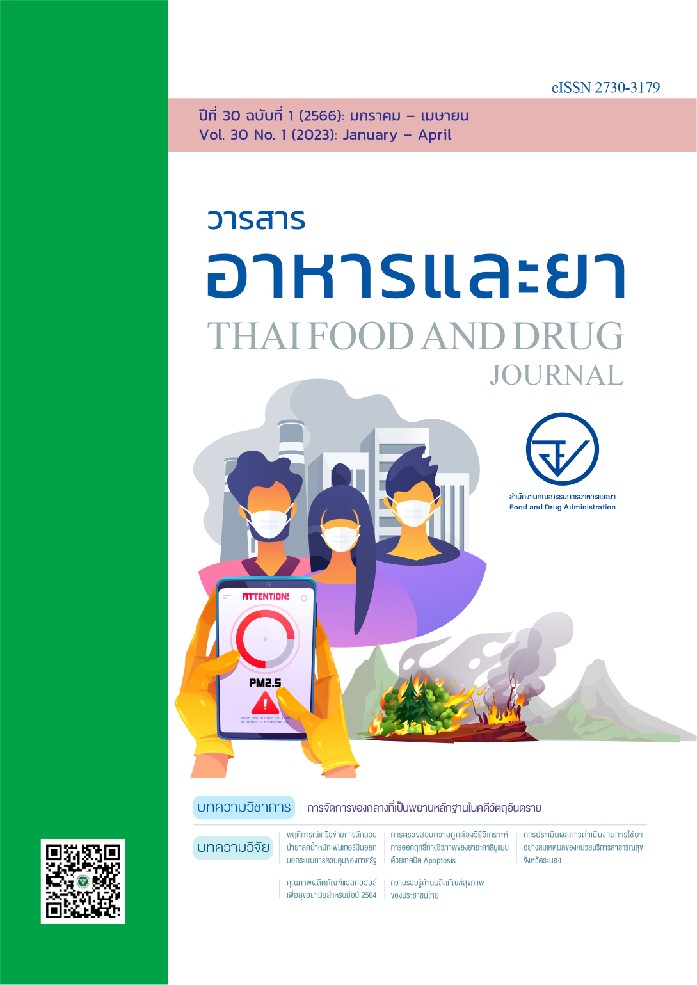การตรวจสอบความถูกต้องวิธีวิเคราะห์การออกฤทธิ์ทางชีวภาพของยาอะดาลิมูแมบด้วยเทคนิค Apoptosis
Main Article Content
บทคัดย่อ
ความสำคัญ: ยาอะดาลิมูแมบเป็นยาต้านภูมิคุ้มกันที่จำเพาะต่อ tumor necrosis factor-alpha นิยมใช้ในการรักษาโรคที่เกิดจากการอักเสบจากภูมิต้านทานตนเอง มีความจำเพาะต่อโรคสูงเนื่องจากเป็นโมโนโคลนอลแอนติบอดีชนิด fully human recombinant immunoglobulin G1 (IgG1) โดยมีการนำเข้ามาขึ้นทะเบียน ในประเทศไทยหลายยี่ห้อ ซึ่งต้องมีการควบคุมคุณภาพยาก่อนจำหน่าย ทั้งด้านเคมี-ฟิสิกส์ และการออกฤทธิ์ทางชีวภาพ แต่ปัจจุบันยังไม่มีวิธีที่เป็นมาตรฐานการตรวจสอบความแรงในตำรายาสากล จึงมีความจำเป็นต้องพัฒนาศักยภาพทางห้องปฏิบัติการในการกำหนดวิธีมาตรฐานที่มีความเหมาะสมและน่าเชื่อถือทางวิชาการสามารถนำมาตรวจวิเคราะห์ยาอะดาลิมูแมบทุกๆ ยี่ห้อได้
วัตถุประสงค์: เพื่อตรวจสอบความถูกต้องของวิธีการตรวจการออกฤทธิ์ทางชีวภาพของยาอะดาลิมูแมบด้วยเทคนิค apoptosis โดยใช้เซลล์ U-937 เป็นเซลล์เป้าหมาย สำหรับนำมาใช้เป็นวิธีมาตรฐานในการควบคุมคุณภาพของประเทศไทย
วิธีการวิจัย: เป็นการศึกษาเชิงทดลอง (experimental research) ระหว่างเดือนตุลาคม 2563 ถึง เดือนสิงหาคม 2564 ในการตรวจสอบความถูกต้องของวิธีตรวจวิเคราะห์การออกฤทธิ์ทางชีวภาพของยาอะดาลิมูแมบด้วยเทคนิค apoptosis ในพารามิเตอร์ ความจำเพาะ ความเที่ยง ความคงทน ความแม่น ความเป็นเส้นตรงและช่วงการทดสอบ โดยใช้สารมาตรฐานสากลในการเทียบค่าความแรงสัมพัทธ์
ผลการศึกษา: วิธีมีความจำเพาะต่อยาอะดาลิมูแมบที่ใช้เซลล์ U-937 เป็นเซลล์เป้าหมาย มีความเป็นเส้นตรง โดยแสดงความสัมพันธ์เชิงเส้นตรงตลอดช่วงการทดสอบความแรงที่ 50-100% มีค่าสัมประสิทธิ์แสดงการตัดสินใจ R2= 0.996 มีความเที่ยงสูงทั้งแบบทำซ้ำในวันเดียวกัน และต่างวันหรือต่างนักวิเคราะห์โดยมีค่า %GCV น้อยกว่า 5 สำหรับความแม่นของวิธี พบว่ามีค่าร้อยละการคืนกลับอยู่ในเกณฑ์ 80-125% และมีความคงทนในทุกปัจจัยที่ศึกษา โดยมีค่า %GCV เท่ากับ 5.74-9.57 และไม่มีความแตกต่างกันอย่างมีนัยสำคัญทางสถิติ (p>0.05) โดยผลการวิเคราะห์ความแรงสัมพัทธ์ที่วิเคราะห์ได้อยู่ในช่วง 80-125% เทียบกับสารมาตรฐาน
สรุป: วิธีตรวจสอบการออกฤทธิ์ทางชีวภาพของยาอะดาลิมูแมบโดยการตรวจหาค่าความแรงด้วยเทคนิค apoptosis โดยใช้เซลล์ U-937 เป็นเซลล์เป้าหมาย เมื่อตรวจสอบความถูกต้องของวิธีพบว่ามีความเหมาะสมและน่าเชื่อถือในการนำมาใช้เป็นวิธีมาตรฐานในการควบคุมคุณภาพยาอะดาลิมูแมบที่ขึ้นทะเบียนยา ทั้งในรูปแบบยาใหม่และยาคล้ายคลึงในประเทศไทยได้
Article Details

อนุญาตภายใต้เงื่อนไข Creative Commons Attribution 4.0 International License.
เอกสารอ้างอิง
ŽIGON-BRANC, Sara; BARLIČ, Ariana; JERAS, Matjaž. in vitro cell-based assays for potency testing of anti-TNF-α Biological Drugs. In: Cytokines. IntechOpen, 2019.
Focosi D., Maggi F., Pistello M., Boggi U., Scatena F. Immunosuppressive monoclonal antibodies: current and next generation. Clinical microbiology and infection 2011;17(12): 1759 - 68.
GaBI Online - Generics and Biosimilars Initiative. Biosimilars of adalimumab [Internet]. Mol, Belgium: Pro Pharma Communications International; [cited 2022 Jan 12] Available from: https://gabionline.net/biosimilars/general/Biosimilars-of-adalimumab
WHO Expert Committee on Biological Standardization. Report on a Collaborative Study for Proposed Candidate 1st International Standard for Adalimumab. World Health Organization; WHO/BS/2019.2365.
สำนักยา สำนักงานคณะกรรมการอาหารและยา. คู่มือและหลักเกณฑ์การขึ้นทะเบียนตำรับยาชีววัตถุคล้ายคลึง (Biosimilars) [อินเทอร์เน็ต]. กรุงเทพฯ: อักษรกราฟฟิคแอนด์ดีไซน์; 2561 [เข้าถึงเมื่อ 23 ก.พ. 2563]. 125 หน้า. เข้าถึงได้จาก:http://www.fda.moph.go.th/sites/drug/Shared%20Documents/Biosimilars/Biosimilar.pdf
สุชาติ จองประเสริฐ. ยาชีววัตถุคล้ายคลึง (Biosimilars) ในบริบทสาธารณสุข. วารสารอาหารและยา 2557; 21(1): 9-14.
WHO Expert Committee on Biological Standardization. Annex 2: Guideline on evaluation of similar biotherapeutic products (SBPs). WHO technical report series No. 977. World Health Organization 2013: 51-89.
Yang H, Kim HJ, Zhang L, Strouse RJ, Schenerman M, Jiang X. Implementation of parallelism testing for four-parameter logistic model in bioassays. PDA Journal of Pharmaceutical Science and Technology 2012; 66(3): 262-69.
European Medicines Agency. ICH Topic Q 2 (R1) Validation of Analytical Procedures: Text and Methodology. (CPMP/ICH/381/95) [Internet]. 1995 [cited 2021 Jun 19]. 15 p. Available from: https://www.ema.europa.eu/en/documents/scientific-guideline/ich-q-2-r1-validation-analytical-procedures-text-methodology-step-5_en.pdf
United States Pharmacopeia (2022). General Chapter, <1033> Biological Assay Validation. USP-NF. Rockville, MD: United States Pharmacopeia. DOI: https://doi.org/10.31003/USPNF_M912_01_01


